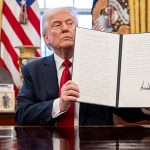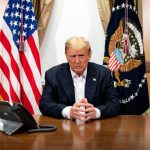Iran’s Minister of Foreign Affairs, Abbas Araghchi, seems to have rolled out the welcome mat for indirect dialogue but slammed the door on any direct talks with the United States. This chilly reception, delivered in comments earlier this week, raises eyebrows in light of President Trump’s recent overtures to the Iranian regime regarding discussions on its notorious nuclear ambitions. This is the same regime that insists its nuclear program is nothing more than a figment of the West’s imagination, even as it treats human rights like a nuisance in the backseat of a car riding down the highway.
In March, Trump made headlines by revealing a letter he sent to Iran’s supreme leader, Ayatollah Ali Khamenei, suggesting that the two countries engage in talks. The request for dialogue was prefaced with a friendly warning that military action could be on the table if negotiations fizzled out. Apparently, Khamenei didn’t get the memo about making America great again, firmly stating that reaching out to the U.S. is both “unintelligent” and “dishonorable.” It seems the ayatollah believes that stirring the pot is better than simmering things down with a friendly chat.
While Tehran insists it will only engage in negotiations via an intermediary, Araghchi is quick to note that the so-called dialogue has yet to materialize. The irony is palpable: Iran claims to be open to communication, yet it turns down any direct interaction while its leaders have the audacity to mock American efforts at diplomacy. In a not-so-cryptic message, Araghchi reiterated that their stance is clear—they’re all for diplomacy, just as long as it’s indirect. What a scenario: diplomatic speed dating without the actual dating part.
Iran Insists Only on 'Indirect' Talks with U.S. — Says None Have Happened Yet Iranian Abbas Araghchi rejected the possibility of direct talks between Iran and the United States in the foreseeable future. https://t.co/hD7tLRMlMw pic.twitter.com/EdSXNTmMKq
— Venik (@venik44) April 7, 2025
Meanwhile, Iranian military leadership echoes Araghchi’s stance on avoiding direct negotiation, giving a hearty thumbs-up to the idea of indirect talks while throwing shade at American reliability. Major General Mohammad Baqeri, who seemingly moonlights as Khamenei’s mouthpiece, only adds to the chaotic declaration that the U.S. isn’t trustworthy and somehow has become the global paragon of unreliability. This from a regime regularly accused of sponsoring global terrorism could either be awfully comedic or tragically sad, depending on one’s perspective.
To top it all off, Trump’s administration isn’t only showcasing its diplomatic finesse but is simultaneously ramping up economic measures against Tehran. With Iran being the world’s leading state sponsor of terrorism, the U.S. is tightening the screws to prevent any funding streams that might bolster their nefarious activities. Recent Treasury Department actions have made it clear: Iran will face repercussions not just for its rogue nuclear aspirations but also for its blatant human rights abuses. It’s as if the U.S. is drawing a firm line in the sand; try to cross it, and the consequences will make it a rocky road ahead.
A comedic twist to this serious geopolitical drama unfolds as Iran continues to reject these direct overtures while simultaneously dangling the possibility of other communication routes, conveniently skirting around any actual accountability. It appears the Iranian regime is committed to playing hardball, cozying up to indirect channels even as it blusterously dismisses any understanding and common ground with the U.S. But the truth remains: until Tehran decides to step off its high horse and actually engage in intelligent dialogue, the world will be left to wonder who is truly pulling the strings in this convoluted chess match.




